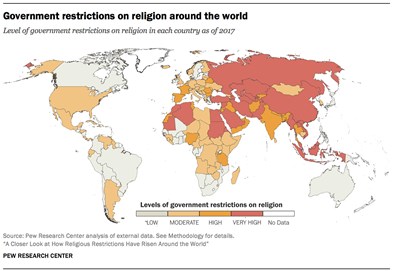Christians and Muslims, the largest and most widespread globally of any group, experienced government and/or social religious persecution...
Pew: Christian, Muslim persecution most widespread

by Diana Chandler
WASHINGTON, July 16, 2019 (BP) — Christians and Muslims are persecuted in more countries than any other religious group, Pew Research Center said in a decade-long study showing high levels of persecution in 42 percent of countries studied.
Christians and Muslims, the largest and most widespread globally of any group, experienced government and/or social religious persecution in 143 and 140 countries respectively, Pew said in the latest installment of its study on religious restrictions around the world. But persecution levels varied among countries.
Study results released Monday (July 15) cover government restrictions and social hostilities based on religion from 2007–2017.
Christians and Muslims suffered the most harassment in the Middle East-North Africa region, the study confirms, while the Asia-Pacific region showed the second highest levels of Christian persecution. Europe came in second in persecution of Muslims.
Christians were persecuted in all 20 countries in the Middle East-North Africa region, in 73 percent of European countries, and in 60 percent of countries in sub-Saharan Africa and the Americas.
“The latest data shows that 52 governments — including some in very populous countries like China, Indonesia and Russia — impose either ‘high’ or ‘very high’ levels of restrictions on religion, up from 40 in 2007,” Pew said in a press release. “And the number of countries where people are experiencing the highest levels of social hostilities involving religion has risen from 39 to 56 over the course of the study.”
While persecution levels have varied within the course of the 10 years the annual report has been compiled, the 10th anniversary of the study allowed Pew to document trends among 198 countries in distinct categories of government restrictions, termed the Government Restrictions Index or GRI, and social restrictions, tracked on a Social Hostilities Index or SHI.
Comprising both the GRI and the SHI, 83 countries or 42 percent of those studied experienced high or very high levels of overall restrictions on religion, Pew said. The percentage is just below a 10-year peak of 43 percent in 2012.
“As in previous years, most countries continue to have low to moderate levels of overall religious restrictions in 2017,” Pew said in its press release.
In general, Christians were persecuted in 143 countries in 2017, compared to 107 in 2007. Muslims were persecuted in 140 countries in 2017, compared to 96 in 2007; Jews, 87 countries compared to 51; Others, encompassing such faiths as Sikhs, Zoroastrians, Baha’i, 50 compared to 33; folk religions, 38 up from 24; Hindus, 23 compared to 21; and Buddhists, 19 up from 10. The unaffiliated were persecuted in 23 countries in 2017, Pew said, compared to 3 in 2012, the earliest year the group was studied.
Christians, Muslims, Buddhists and Hindus experienced more widespread government harassment, while Jews were among those suffering more social harassment.
Government restrictions
In 2017, about a quarter of countries studied, 26 percent, showed “high” or “very high” levels of government restrictions including laws, policies and governmental actions restricting religious beliefs and practices, down from 28 percent in 2016 but up from 20 percent in 2007.
On a GRI index of 1-10, countries registering highest in persecution are China (8.9), Iran (8.4), Malaysia and Syria (8.3), Maldives (8.2), Russia (8.1), Algeria, Egypt and Uzbekistan (8.0), Indonesia and Turkmenistan (7.9), Saudi Arabia (7.8), Eritrea and Vietnam (7.6), and Tajikistan (7.5).
The GRI comprises 20 measures of restrictions including government favoritism of religious groups, highest in the Middle East; government laws and policies restricting religious freedom, which increased globally but remains highest in the Middle East; government limits on activities of religious groups and individuals, which has doubled in Europe but remains highest in the Middle East; and government harassment of religious groups, which has increased in every region since 2007.
Social hostilities
Countries with “high” or “very high” levels of social hostilities involving religion, including acts of religious hostility by private individuals, organizations or societal groups, registered at 28 percent in 2017, short of a 10-year peak of 33 percent in 2012. Sixty-six countries in 2017 rose on the SHI scale, while 75 countries fell.
Countries ranking highest in 2017 on the SRI scale of 1-10 are India (9.5), Syria (9.0), Iraq (8.8), Egypt (8.5), Nigeria (8.1), Central African Republic and Pakistan (7.7), Israel (7.3), Bangladesh (7.2), Germany, Libya, Somalia and Ukraine (7.1), and Palestinian territories (7.0).
The SHI measures religiously hostile acts based on 13 parameters grouped into categories including hostilities related to religious norms, which rose more in the Americas, Europe and sub-Saharan Africa; interreligious tension and violence, which declined most in the Americas; religious violence by organized groups, highest in the Middle East; and individual and social group harassment, which rose most substantially in the Americas.
Pew terms harassment as an offense against a religious group or person due to their religious identity, and can include being physically coerced or singled out to make life or religious practice more difficult. Harassment ranges from verbal or written acts to physical violence and killings.
Study results are available at https://www.pewforum.org/2019/07/15/a-closer-look-at-how-religious-restrictions-have-risen-around-the-world/.
The original story can be found at: http://www.baptistpress.com/53287/pew–christian-muslim-persecution-most-widespread
Reprinted from Baptist Press (www.baptistpress.com), news service of the Southern Baptist Convention.
Read more at XPian News… https://xpian.news/category/international/

Diana Chandler
Diana Chandler is Baptist Press' general assignment writer/editor. BP reports on missions, ministry and witness advanced through the Cooperative Program and on news related to Southern Baptists' concerns nationally and globally.




Comments are Closed